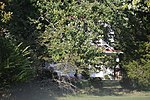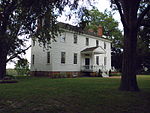Hopewell High School (Virginia)
1915 establishments in VirginiaBuildings and structures in Hopewell, VirginiaEducational institutions established in 1915Public high schools in VirginiaVirginia school stubs
Hopewell High School is a secondary school located in Hopewell, Virginia. Built in 1968, it is the only High School in Hopewell, Virginia. From 1925 to 1968, the high school in Hopewell was located at the Hopewell High School Complex, also known as James E. Mallonee Middle School.
Excerpt from the Wikipedia article Hopewell High School (Virginia) (License: CC BY-SA 3.0, Authors).Hopewell High School (Virginia)
Fire Lane, Hopewell
Geographical coordinates (GPS) Address Nearby Places Show on map
Geographical coordinates (GPS)
| Latitude | Longitude |
|---|---|
| N 37.289805555556 ° | E -77.31475 ° |
Address
Hopewell High School
Fire Lane
23860 Hopewell
Virginia, United States
Open on Google Maps






